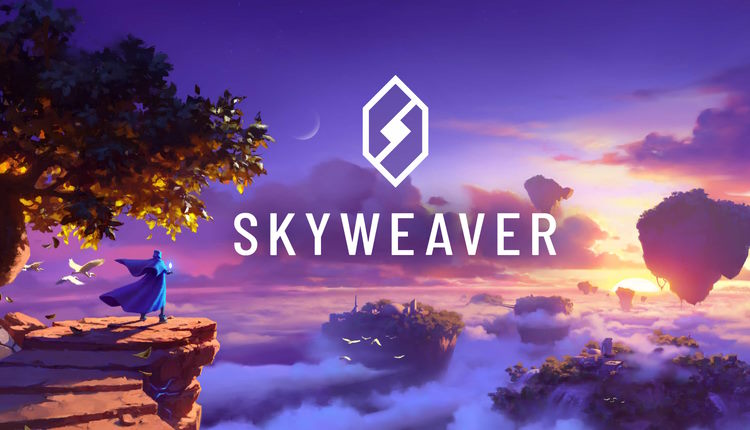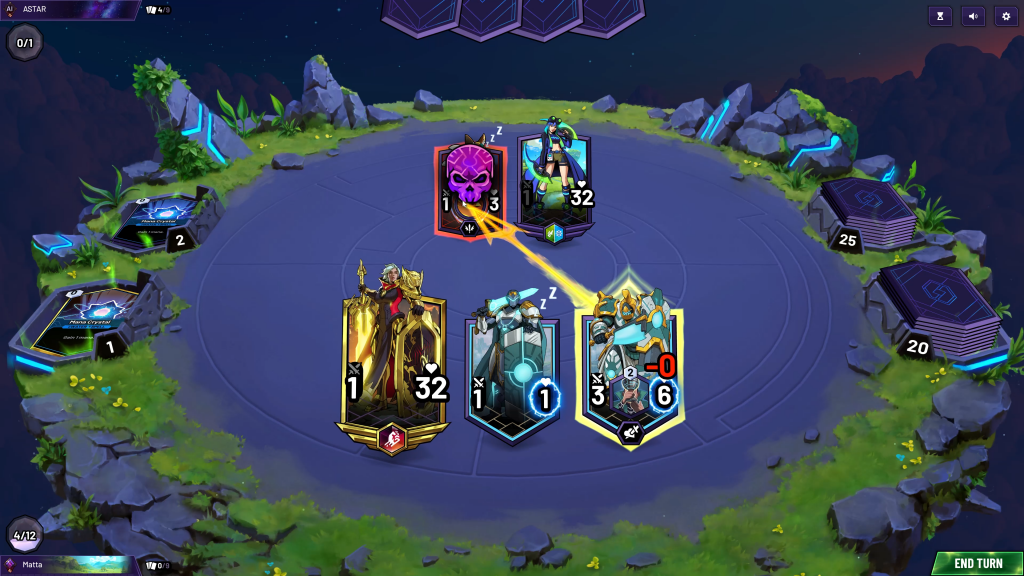How Horizon is making blockchain games accessible for everyone

At GDC 2023, there was a strong turnout by blockchain developers and the focus was, pleasingly, on fun games to play. And there was also a noticeable lack of cynicism. Games using blockchain were taking their place alongside all the other formats on show. The tech seemed, finally, like a behind-the-scenes tool to create innovative game experiences that can appeal to the broader gaming community, not just the crypto enthusiasts.
Likewise, the team from Horizon Blockchain Games were ready to talk about its card game Skyweaver and the backroom tech platform Sequence that will make web3 gaming smoother for everyone.
The Skyweaver team recently revealed its 2023 roadmap, including The Skypass, a way to claim free and premium rewards while playing; new hero abilities; a new Tournaments feature; improved seasonal quests; draft mode; an update to the economy, including new Spark and Weave currencies; over 100 new cards for starter decks; and a Puzzle Maker so the player community can make its own puzzles.
The promise of decentralisation
“Our mission is to make web3 easy, fun, and powerful for users and builders,” says Horizon’s chief storyteller Michael Sanders.
“I’ve been in the blockchain space since 2010 – I just became fascinated by this notion of decentralisation. I met Vitalik Buterin, the inventor of Ethereum, in January 2014. I am still convinced that he’s an alien from the future who’s here to teach us. I fell in love with this idea of next-generation internet applications where users and creators shared in the value of the ecosystems they participate in.”

By his own account, Sanders spent a lot of time thinking about how to turn this “esoteric concept” into a technology that could benefit end users. “I didn’t have any good ideas, to be honest with you,” he laughs.
“But then I met Peter Kieltyka, our CEO and my co-founder, and, to my knowledge, the first person to have conceptualised blockchain games back in 2017. The moment he explained it to me, I realised this is how we will use this incredible technology in a fun, rocking way.”
The pair founded Horizon in December 2017. “We wanted to make something that anyone could enjoy, that our friends could enjoy,” says Sanders. “We thought that a trading card game is the perfect analogy because in a physical trading card game, you own the items themselves. We’re translating that to a digital environment. So we came up with Skyweaver.”
The team targeted card game players and casual game players generally, not just web3 enthusiasts. And to achieve that, they knew they needed a ton of blockchain infrastructure working in the background, so they also began developing a set of tools for developers, an all-in-one blockchain developer platform and smart wallet called Sequence.
The challenge of onboarding gamers
We heard this intention echoed by other developers throughout GDC – the need to appeal to everybody, including traditional and casual gamers who might not be familiar with web3. Is that what Horizon sees as its most significant challenge?
“Yes and no,” says Michael Sanders. “That’s part of it! Many web3 games that have existed were very ‘first generation’. A lot of them were focused on dealing with the technology, trying to work around it, because it’s so cumbersome. They lost something in trying to make a game that’s fun, because they couldn’t focus as much energy or resources on it.
“But now, fortunately, with Sequence and other tools that exist, the game designers can forget about that stuff, and it’s taken care of. And then they can just focus on making great games. As long as the blockchain stuff is abstracted away, the gamer doesn’t have to think or worry about it.”
Skyweaver’s game director Eddie Fear, adds: “Additionally, the web3 technology is not applied universally where it isn’t necessary. One of the issues I’ve seen in web3 game development is that people declare, ‘We’re making a web3 game’, and so they want to web3-ify everything. Everything has to be a tradable asset, and a token, and available on the chain. Whereas you could make some of these things standard in-game tokens, which just ends up being better for absolutely everyone! You have better control of your economy. You can keep some ratios standard between different units within the game. And just the parts that are exciting to be web3, can be web3.”
People declare, ‘We’re making a web3 game’, and so they want to web3-ify everything
Eddie Fear
Fear goes further: “If you’re playing an MMO fantasy game, it’s great if you have the enchanted, mythical sword that’s web3. So you own it yourself, and it exists on the blockchain, and you can trade it with someone else. That’s very exciting. But I don’t need my leather loincloth to be a token.”
When it comes to the team’s own Skyweaver game, they don’t like calling it a web3 game (“It’s as reductive as saying web2 games,” says Fear. “Rocket League or World of Warcraft or Call of Duty, they’re all web2-era games. It doesn’t necessarily mean anything.”).
The 2023 roadmap makes the team’s intentions clear, calling the studio’s treatment of the economy “remarkably cautious” in a commitment to avoid “the error of trying to design the game around the market”.
Quests, characters and the fanbase
So what else is the team planning? “We have a free and a premium Skypass that people can get, either by buying in-game assets or playing for one time, free,” continues Fear, drawing attention to the roadmap.
“We’re adding new economic features that will be coming out that will allow the crafting of individual cards, and enable the players to customise their own experience, and build the decks they want to on a better cadence. Right now, you keep unlocking cards as you play. But you don’t have as much agency as I would like to see for doing that on the pace with the cards that you would like. So we are making that experience much more customisable and coming up with a more robust questing system.”
The team is revamping some of the core tenets of the game while it’s being beta tested. The plan is for Skyweaver to have daily, weekly, and seasonal quests; later in the year, there will be a Draft mode. Before then, the character cards of Skyweaver will be given new abilities, “making the play experience for each of the heroes much more interesting and unique,” according to Fear.
And this is important because some big titles currently dominate the collectable card game landscape. Skyweaver may have the blockchain element in its favour, but as a card game, it’s competing with the likes of Hearthstone and Marvel Snap, both much-loved games with heavyweight IPs behind them, and even Magic: The Gathering, with a 30-year history as a tabletop favourite.
Eddie Fear is aware of this and knows that Skyweaver has to find a way to onboard casual gamers. “Our game was developed by some very experienced people. And something that often happens in game development is that you’ll see people designing the games they want to play. So it’s pretty hardcore right now! We have thousands of active players who are very invested and serious. That, unintentionally, means the new user experience can be difficult. We hold your hand as much as we can, but eventually, we throw you to the lions, and our lions are a pretty voracious crowd.”
He laughs at that but says, “So we’re adding new tutorials and new quests and things to soften that up. We’re adding more ‘gamelets’ so that you’ll be able to more easily curate your experience. If you are trying to get very deep into the game, and play an intense game, we’ll have that for you. If you’re trying to do it for four minutes on your lunch break, you’ll be able to have a pretty quick experience as well.”
The state of the play-to-earn gaming market
Do the Horizon team agree that there’s been a shift, as we perceived at GDC – a move away from crypto culture towards mainstream games that quietly use blockchain tech in the background?
“Absolutely. I think it’s the normal progression of things,” confirms Fear. “Originally, the focus was on the web3 part, not the game part. Eventually, I expect that to be stripped back. There is an understanding that the model, as proposed two or three years ago for play-to-earn games, was untenable. People have come to the logical understanding that you must build enjoyable games. Then you can have a segment of your economy that [plays to earn]. I think 80% of your players are playing for fun. 10% are trying to make money. 10% will make money! You can build that and have that sustain.”
We’ve abstracted all of that stuff away. The user doesn’t need to know about it
Michael Sanders
He suggests that people have moved past the idea that any player who wants to can make a living at a game. “You would try to build something like Axie Infinity, where someone could make a living at the game. That’s a problem for several reasons. It creates untenable economies. You could end up with a Ponzi scheme, and you have to keep getting new people in to pay for that,” says Fear.
“A well-designed economy would have most people playing the game for fun and have an option for some people who are especially skilled at it to do it for a living.”
Smart contracts and simplification
In the game’s background, Horizon has a platform called Sequence that manages everything.
“It’s a full stack that solves the complexities around building a web3 game,” explains Sanders. “First is the smart wallet we’ve built. We’ve solved user onboarding into web3. Users can create a secure and non-custodial, multi-chain, smart contract wallet in two clicks. Smart contract wallets are the future of web3. In fact, 99% of wallets will likely be smart contract wallets in the coming years. We’re pioneers in that space.”
Essential to this process is how seamless it seems to the end user. Sequence simplifies “the onboarding issue” for any game maker. Accompanying the wallet is a transaction delivery system for gasless transactions, for instance. Sanders again: “It’s essential for onboarding new users who won’t own a token native to a chain. Now they don’t even need to think about that.”
Indeed, Sequence includes the ability to buy collectables using credit or debit, so the users never actually need to acquire cryptocurrency directly before they start.
And for developers, Sequence has an indexer so that they can query the data on the blockchain in real-time and serve it to their users in a way that’s easy for gamers to understand.
“Any sort of web3 adoption has to have an easier way to buy in than already having a wallet or already having coin,” says Eddie Fear. “I play web3 games, and on some of them, I’ve played the game, and only later do I find out I have a wallet, which feels great. But then there are other ones where to play, I have to immediately buy a thing that costs $1.80, and I have to set up a wallet, and then there’s gas, which is another 5 cents. I’m trying to pay for that, but the game tells me I need an ‘Ethereum nickel’ or whatever that I have to go somewhere and buy… I want my 81-year-old grandmother from Dubuque to give this a try! That’s not going to happen under these unnecessarily complex circumstances.”
“We’ve abstracted all of that stuff away,” confirms Sanders. “It’s happening behind the scenes – the user doesn’t need to know about it.”
Sequence includes marketplace tools so developers and app builders can have their own in-game marketplace, providing users with a more familiar experience within the game UI. There are SDKs for Unity, Unreal and mobile platforms.
Looking to future adoption
So far, Skyweaver is using Sequence, and so is Super Gaming, one of the most successful Indian games companies, who have plugged it into Tower Conquest: Metaverse Edition. Sequence also powers Hunters On-Chain by BoomLand and Sunflower Land, a farming simulator by Thought Farm. These are web2 titles which have ventured into web3 using the Sequence tools. And while we were at GDC, Fenix Games announced a partnership with Horizon Blockchain Games to use the Sequence infrastructure in its titles too.
“We have a really rich pipeline ranging from small, web3-native start-ups of five people to much bigger companies,” says Sanders. “Some of our investors are Ubisoft and Take-Two. They’re looking at these things. This is the spectrum of the kind of game builders leveraging our tools.”

Find out more about Horizon Blockchain Games and Sequence on its official website, where you can also play Skyweaver and read this week’s new roadmap for the game.
